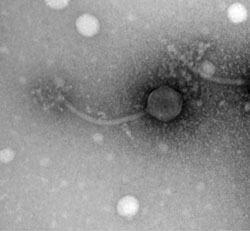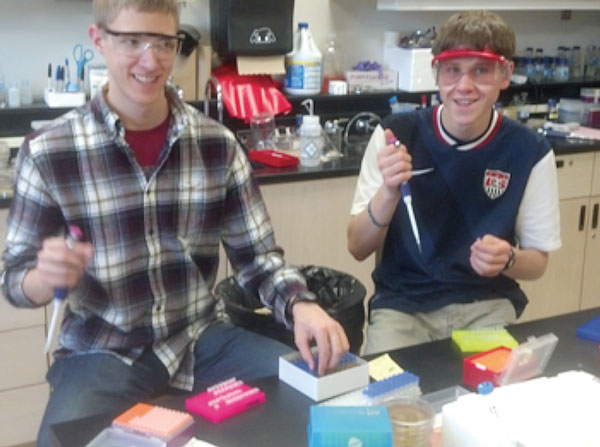
Bacteriophage "BoryCriar" was isolated in the BRIC Phagedigging Program. Photo courtesy of Dr. Jim Driver, University of Montana EMtrix.
[The Montana Professor 25.1, Fall 2014 <http://mtprof.msun.edu>]
Submitted by the program directors
Too often in education, the joy of scientific discovery is a carefully guarded secret. Yesterday's amazing discoveries, today's ideas, and tomorrow's questions are deeply buried under mundane presentation, forced memorization, or rote regurgitation for standardized tests. Curious children—potential scientists—turn to other creative endeavors, or, worse, lose their spark to learn about their world. A tiny biological organism has the power to change this. Bacteriophages, tiny viruses that infect bacteria, can be isolated from environmental soil and water samples using introductory microbiological techniques that are tractable to high school, middle school, and even grade school students.

In 2005, Dr. Marisa Pedulla joined Montana Tech's Biology Department as Assistant Professor. For nine years, the 1996 Olympian has shared her passion for microbiology and science education with students and teachers across Montana. In addition to teaching 31 different (mostly newly developed and offered) classes, Dr. Pedulla has mentored research projects for over 30 undergraduate and 8 graduate students in her laboratory. Beyond campus borders, Dr. Pedulla has taken discovery science to dozens of precollege teachers and over 3,500 precollege students in the "Phagedigging" Outreach program. The success of this project and its potential to transform science education was recently recognized by the National Institutes of Health (NIH).
In April 2014, the NIH Science Education Partnership Award (SEPA) announced a grant of $1.25 million to Montana Tech for a science education research project titled, "Bringing Research into the Classroom (BRIC): A Partnership for Research and Education In the Montana Public Schools." Dr. Pedulla and Rayelynn Connole, director of Cfwep.Org, are co-leading this effort. The BRIC project combines intensive professional development for teachers with in-class bacteriophage discovery, mentored by university faculty and undergraduate students. The project goal is to equip Montana's K-12 teachers with the knowledge, skills, and dispositions to provide high-quality health science research opportunities for students.

Montana Tech Biology Faculty and Cfwep.Org Education Experts will mentor pre-college students and teachers as well as undergraduate and graduate students in a coordinated research effort to discover and characterize bacteriophages. The number of bacteriophages on earth is astounding; with n=1031, they outnumber all other living organisms combined. Their vast numbers and great genomic diversity mean that no identical phages have ever been independently isolated. Anyone who is provided simple instruction and a few inexpensive supplies can discover a virus previously unknown to science. Beyond simple discovery, the biological, genetic, biochemical, molecular, and bioinformatic characterization provide ample material for scientists of every level, including Nobel laureates. For example, classic experiments with phages demonstrated that DNA is the genetic material, and their gene products provided the tools that allow DNA cloning, the foundation of molecular biology.
By equipping teachers to facilitate bacteriophage discovery within their classrooms, the BRIC project aims to build a cadre of teacher leaders in Montana. These teachers will engage their students in rigorous and relevant research experiences and mentor other teachers to do the same. BRIC and the teachers involved will enable Montana students to personally experience the excitement of scientific discovery. Montana Tech undergraduate students, as near-peer mentors, will serve as role models to provide students a glimpse of what is possible.
BRIC-funded classroom visits began in May, 2014, with recruitment of teachers ramping up in the fall. Four years of two-week summer teacher research workshops will begin summer 2015, with a capstone workshop in summer 2019.
Anaconda High School teacher Kate Mattern, 2012 Montana NABT Biology Teacher of the Year, noted with enthusiasm, "Through this grant, our students will gain an appreciation for research and scientific partnerships that fosters a love of science and an understanding of its process and importance."
Montana Tech Chancellor Don Blackketter added, "The BRIC project exemplifies Montana Tech's commitment to outstanding STEM [Science, Technology, Engineering, Mathematics] educational experiences for K-20 students. The award also recognizes Tech's high-quality faculty and staff and their commitment to science education."
[The Montana Professor 25.1, Fall 2014 <http://mtprof.msun.edu>]